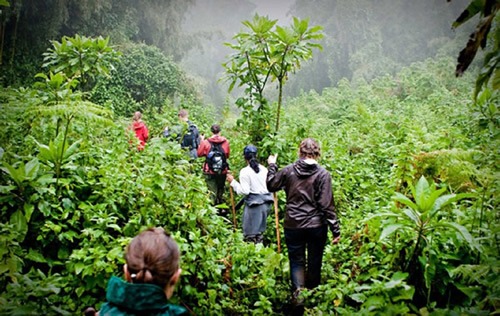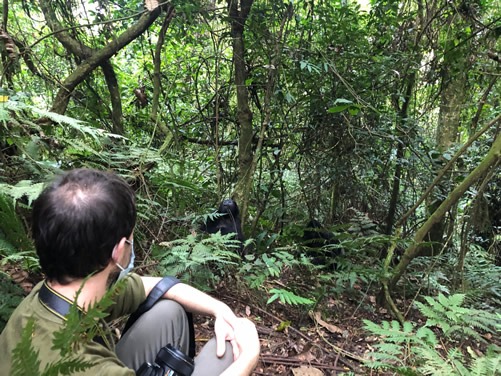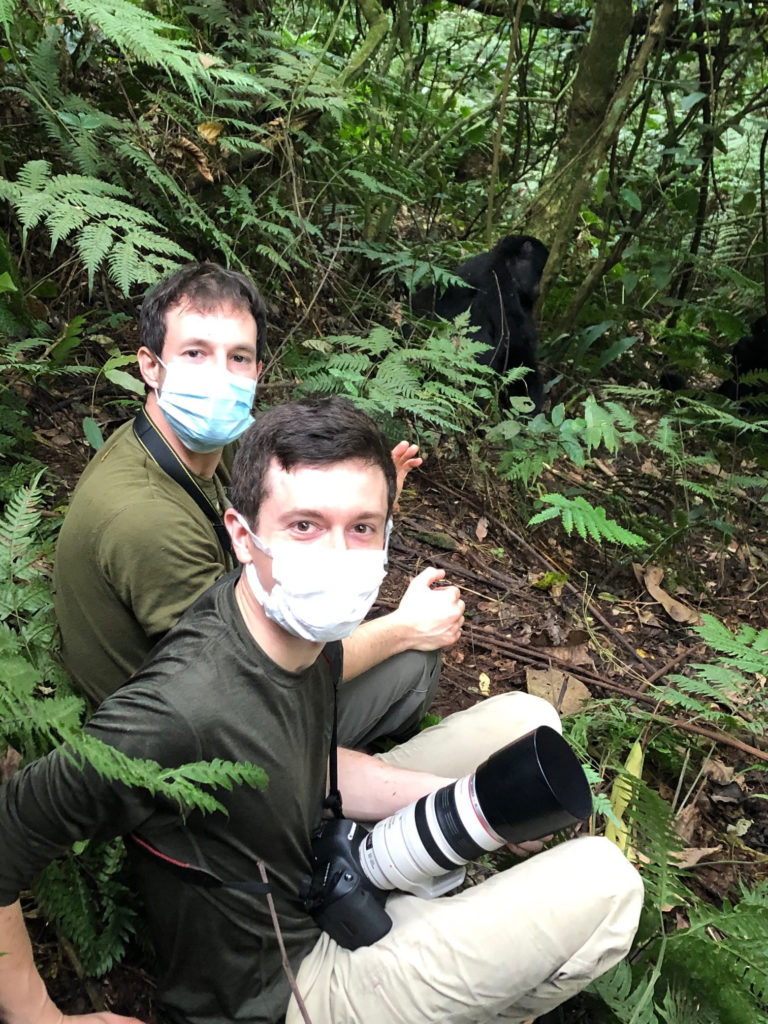Gorilla Trekking during Covid
After coming out of the first and second major lock-downs, Uganda and Rwanda’s tourism industries look set to go back to a time when thousands of travelers would visit to see the amazing mountain gorillas. The first major lock down severely affected the tourism industry globally and the two countries were no exception. Airports where closed and no one was allowed to come out of their houses after late afternoon.
 Travel in private or public vehicles was prohibited at some point. Only a few vital services and sectors remained open. Gorilla tourism was suspended as the Wildlife Authorities feared that the primates would be severely affected in case of a COVID-19 outbreak.
Travel in private or public vehicles was prohibited at some point. Only a few vital services and sectors remained open. Gorilla tourism was suspended as the Wildlife Authorities feared that the primates would be severely affected in case of a COVID-19 outbreak.
Is COVID-19 a threat to gorillas and other primates? There are no conclusive studies or research that have been conducted relating to COVID-19 and large primates. However, it is important to point out that large primates have similar DNA to humans. Researchers have found that gorillas and other primates can be severely affected by respiratory diseases like colds, flu and cough. As a respiratory illness, COVID-19 was thought to have the same deadly potential if it crossed to the primates. If this occurred, it would be very bad news because primates are more vulnerable and helpless. They don’t have the ability to inform others that they are sick unless experts take the initiative to find out. Primates live in remote and dense forests that are hard to reach in case of an outbreak. They have no idea of social distancing or other methods to contain coronavirus infections. An entire population of gorillas could be wiped out if Covid-19 spread among them uncontrollably.
Animal conservationist fears where confirmed when a group of gorillas got infected by the coronavirus at the San Diego zoo. Although none of them succumbed to the virus, it was a clear indicator that if large scale infections occurred in the wild, there would be no doctors to monitor each primate.
What happened to the primates when gorilla tourism was suspended?
When gorilla trekking was suspended, conservationists and stakeholders in the tourism industry became worried that the habituated gorilla families would become wild again. They were also worried that poaching would gain ground since there were no tourists and everyone was self-isolating. There worries  were justified but park authorities in Uganda and Rwanda continued monitoring the gorillas on a daily basis. These frequent check-ups and monitoring ensured that the gorillas remained comfortable around human presence.
were justified but park authorities in Uganda and Rwanda continued monitoring the gorillas on a daily basis. These frequent check-ups and monitoring ensured that the gorillas remained comfortable around human presence.
Park patrols were also intensified to curb poaching which was becoming a problem in Uganda as a result of the lock-down. The number of new births was also higher than anticipated in Uganda because 10 gorilla babies were registered during the lock down. Any funding gaps were quickly filled by organizations like the United National Educational, Scientific and Cultural Organization (UNESCO).
What made the Uganda and Rwanda re-open gorilla trekking during the on-going coronavirus pandemic?
 Gorilla tourism had to be reopened for medical, conservation and financial reasons. It is important to state that when the decision to reopen tourism was made, the two countries felt that they understood the new disease better. They had also drafted similar standard operating procedures to be followed by tourists, tour operators and personal working in the national parks. These measures were put in place not only to protect large primates from the Coronavirus but also other wildlife, staff in the parks and tourists.
Gorilla tourism had to be reopened for medical, conservation and financial reasons. It is important to state that when the decision to reopen tourism was made, the two countries felt that they understood the new disease better. They had also drafted similar standard operating procedures to be followed by tourists, tour operators and personal working in the national parks. These measures were put in place not only to protect large primates from the Coronavirus but also other wildlife, staff in the parks and tourists.
Unlike developed countries, Uganda and Rwanda cannot afford to keep their countries down for too long. People are poor and with no source of income will turn to the natural resources for survival. Moreover, the money from tourism is needed for wildlife conservation activities like park patrols and community sensitization. Even though organizations like the UNESCO offered help, this could not be sustainable in the long run.
Money collected from tourists is used to pay many of the Rangers and run community projects around the national parks. Without money from tourism, communities living close to the park would see no value in the primates or other wildlife hence encouraging poaching. Before I forget to mention, Rafiki, a popular silverback in Bwindi was killed by poachers during the first lock-down period. Over 822 traps were also found by Rangers in Bwindi impenetrable national park by April 2020 as opposed to 21 in 2019. These findings, show that gorillas are not safe without gorilla tourism.
Unfortunately, poor communities need to see the benefit of the primates and other wildlife. Without food at the table any society will resort to other means of survival including making a meal of wild animals. To that end the governments in both Uganda and Rwanda ensure that some of the money collected from gorilla permits is injected into local community projects like building new schools, hospitals and wells. Many of the local people living close to the gorilla parks are employed as safari Guides, porters or as hotel/lodge staff. If their source of income is no more, they may resort to encroaching on gorilla habitat for a livelihood.
Measures to prevent COVID-12 during gorilla trekking
The standard operating procedures for gorilla trekking during COVID currently enforced in Rwanda and Uganda are similar although with some notable differences. In each country, advise was sought from the Ministries of Health in order to ensure consistency in application of the measures.
One of the notable measures was to equip park personnel with tools and skills to operate effectively during this COVID-19 pandemic. Park rangers have been given personal protective gear to wear while with tourists and with the gorillas. Almost all personnel working in game parks have been vaccinated against the coronavirus. Temperature guns have also been placed at every entry point of a particular park. In every park, there are medical personnel available to check for any symptoms of COVID-19. A traveler will be isolated and deterred from taking part in gorilla trekking if any symptom of COVID-19 is detected.


